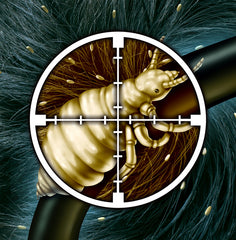LiceGuard News — lice
A Super Lice strain has emerged which are resistant to common lice treatments (shampoos). LiceGuard’s RobiComb kills Super Lice on contact. 1
NBC news reports on Super Lice outbreak:
A Super Lice strain has emerged which are resistant to common lice treatments (shampoos). LiceGuard’s RobiComb kills Super Lice on contact.
Very few products on the market can successfully claim both safety and efficacy like the RobiComb.
LiceGuard® No Nit Kit that is non-toxic and pesticide free. The kit contains a shampoo, magnifying glass, and micro-tine comb. Lice eggs are covered in a sticky substance which binds them to human hair follicles. LiceGuard’s shampoo loosens that grip and allows lice and eggs to be picked out of the hair easily and effectively.
LiceGuard® Lice Repellent is one of the few non-toxic repellents on the market. It utilizes a proprietary repelling ingredient developed over a decade ago, tested extensively, and protected under trade secret. With a few squirts, it prevents lice with 24 hour protection.
Lice resistance is creating a vicious cycle: frustrated parents overusing pesticide-based treatments that don’t work – resulting in dangerous levels of toxicity in children.
-
12 deaths relating to prescription-based pesticides Lindane and Malthion.
-
6 deaths (including 2 suicides) relating to OTC pesticide Permethrin.
-
Other reports described conditions such as shortness of breath, hallucinations, and nausea.
RobiComb doctor recommended in the Journal of American Academy of Dermatology
“As a dermatologist, I have not been particularly impressed with the efficacy of available chemical pediculicides in the treatment of head lice. I chanced upon what has now become my treatment of choice for head lice, the LiceGuard® RobiComb. This non-chemical therapeutic modality is not only painless and odorless, but also has been efficacious each of the six times I have used it. Furthermore, therapeutic resistance does not seem to be a consideration because the mechanism of action is fundamentally electrocution.” Kenneth S. Resnik, MD
- Rob Irving
- Tags: lice robicomb Super Lice
How to Kill Lice 1

Everything you need to know about How to Kill Lice.
As you prepare to engage in the war against head lice, let us be your ally in destroying the pesky little buggers! If this is your first go-around with head lice, we recommend you first checkout our Facts of Lice series to get up to speed with the basics. This article is dedicated to understanding HOW TO KILL LICE - including the details about the two main methods for killing lice.
Head Lice: The Scariest Thing Hiding Behind Your Halloween Costume This Year 0

Yes, you really can get head lice from Halloween costumes!
Of all the frightening creepy crawlies around at Halloween, there is one you definitely can and should protect your children (and yourself!) from – HEAD LICE! Here are a few expert tips for avoiding lice this time of year.
- LiceGuard Webmaster
- Tags: halloween lice prevention



